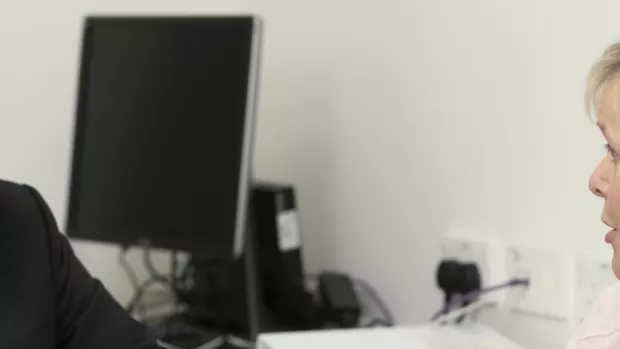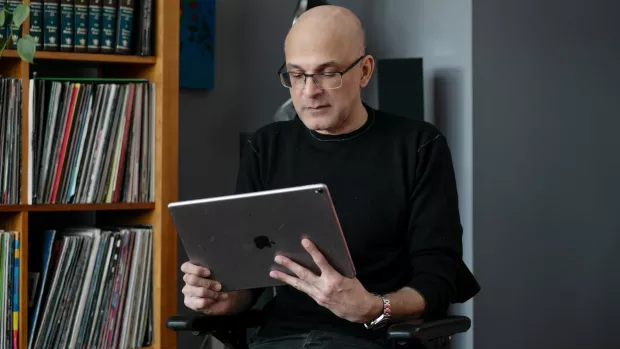
Getting help for cognitive problems
If you’re having problems with memory and thinking, your doctor or MS team can help you find strategies that can help. They might also refer you to other professionals for support with these cognitive symptoms.
If you think you've noticed cognitive changes
If you think you might have cognitive changes, there are lots of day-to-day strategies which people find helpful. But it can also be useful to find out more from your doctor or MS team. They can help you:
- find ways to manage cognitive problems
- refer you on to other health or social care professionals for more help with the symptoms and emotional impact
- help you and those around you understand the symptoms and how to manage them
Armed with accurate information about your cognitive symptoms, you might also want or need to discuss things with your employer, university or school.
Everyone forgets sometimes
Everyone forgets things from time to time and this is completely normal. Just knowing that MS might cause cognitive problems can make us very aware of little lapses in memory. It’s only something to address if forgetfulness happens more than usual, and if it has an impact on what you want to do in your day to day life.
Raising the issue of cognitive changes
Sometimes family or friends notice cognitive changes first. And whether you or someone close to you notices changes, it can be hard for everyone to know how to raise the issue.
For some people, it’s a relief if someone else brings up the subject. It helps identify the difficulties and makes it easier to talk about them openly.
You might want to speak to your GP or MS team to find out more first. Or you could speak to them together with those closest to you. They can help everyone understand more about possible causes and ways to manage it. Cognitive changes might not be down directly to your MS. For example, stress or anxiety can affect memory and thinking too.

Lists keep everything clear and my thoughts more manageable.Trishna, MS Society Ambassador
Professional help for MS cognitive problems
A healthcare professional can help you identify areas where you might benefit from extra help. Depending on your symptoms, your GP or neurologist might refer you to:
- an occupational therapist
- a clinical psychologist
- or a neuropsychologist
They can all help you think about ways of managing your symptoms and suggest equipment and aids that may help.
To do this, they might carry out a 'neuropsychological assessment'.
What is a neuropsychological assessment?
A neuropsychological assessment is used to find out what cognitive problems you’re having – and your personal strengths you can use to help overcome and manage things.
It can include different spoken and written tasks. These might be done electronically, on paper, or both.
You’ll be asked to perform tasks to test:
- your memory
- how you can concentrate
- how you can do things you used to find easy
For example, you might be given a list of words to remember and recall.
A full neuropsychological assessment can take about two to three hours. A follow-up session would explain what the assessment showed.
When they do the assessment a psychologist will be able to take into account things that might be affecting the results, including whether you’re:
- feeling fatigued
- unusually stressed
- depressed
- having a relapse
What happens after the assessment?
After the assessment, they might suggest different strategies like:
- practising and improving any skills
- making better use of your strengths
- finding alternative ways to perform tasks
- finding ways to manage the practical and emotional impact of any changes
- setting individual goals - to help at work, in education or with daily tasks
- counselling (for you or your family)
Your GP might refer you to an Improving Access to Psychological Therapies (IAPT) service. Or you can ask whoever does the assessment for those details to refer yourself.
The support you get might be one-to-one or in groups. Group sessions can be a good way to meet other people with MS cognitive issues. People often find it useful to be able to share experiences and learn from each other in a supportive setting.
Partners and family
Sometimes a partner or family member might be invited to attend a support session. This could help them better understand the difficulties you’re having. And they can also support you by helping you put into practice new strategies and techniques.
“Can’t tell you how helpful it was to meet other people going through similar things. We’ve all been there and we could all say to each other, 'yeah I felt stupid but I found this way’. And just sharing our ideas and stories was wonderful.”Member of a support group for people with MS cognitive issues
What is cognitive rehabilitation?
Cognitive rehabilitation aims to improve your everyday memory and thinking skills, and to promote your independence and wellbeing. It’s a structured set of activities to do this.
Cognitive rehabilitation might help improve your memory, attention and learning. It can also have a positive effect on mood and quality of life.
Occupational therapists and psychologists can both deliver cognitive rehabilitation. They might do this one-to-one or for a group.
Your GP might refer you to an occupational therapist or psychologist.
Are there drug treatments for MS cognitive problems?
There are no drugs developed specifically for cognitive problems in MS, but sometimes drugs licensed for Alzheimer’s are prescribed.
Disease modifying drugs (DMTs) can reduce the number of MS relapses and slow down the damage MS causes over time. But their influence on cognitive difficulties is still unclear.
What are my rights at work with MS cognitive symptoms?
People with MS have rights at work under the Equality Act (or the Disability Discrimination Act if you’re in Northern Ireland). MS cognitive problems are covered by this law as well as physical symptoms.
Under these laws, you can ask your employer for 'reasonable adjustments' to help you work.
You might want to get information about your cognitive symptoms and ways to manage them before you speak to your employer. They could have lots of questions before they can work with you to make reasonable adjustments.
Find out more about your rights at work
What are my rights if I’m at university, college or school?
People with MS at university, college or school are covered by the Equality Act (or the Disability Discrimination Act in Northern Ireland). Under these laws you can ask for 'reasonable adjustments' to make sure you’re not discriminated against because of your MS. That might include having more time to complete assignments, or providing a study area that’s free from distractions.
Disabled Students Allowance
You might also be able to get a grant called a Disabled Students Allowance. That could pay for equipment or travel you need because of MS symptoms. It might also pay for non-medical helpers you need.
Read more about Disabled Students Allowance on the Disability Rights UK website
Last full review: | Next review:
We also update when we know about important changes.



